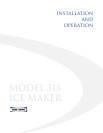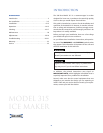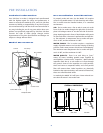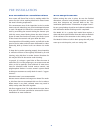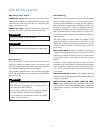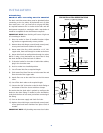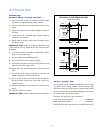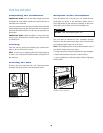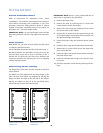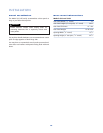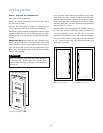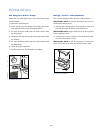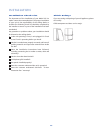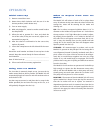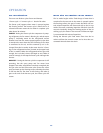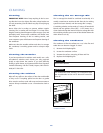
4
Pre-INSTALLATION
Pre-Installation Considerations
Purer water will freeze first in the ice making molds. The
reason for this is that anything dissolved in water lowers
the water’s freezing temperature.
This concentrates most of the impurities in the ice maker
water reservoir where they may form hard deposits known
as scale. The Model 315 dilutes the concentration of min-
erals by over-filling the reservoir during the harvest cycle
(with the excess water flowing down the drain). About 3
quarts of water flow into the unit each cycle. About 1 quart
of that rinses the reservoir and goes down the drain.
Some impurities will inevitably remain, and will stick to the
parts in the ice maker, and will cause malformed ice cubes.
Eventually, built up mineral scale can shorten ice maker
life.
To keep the ice maker operating properly, these impurities
or minerals will have to be regularly dissolved by an acid
cleaning, using Sub-Zero ice maker cleaner. Directions for
this may be found in the section under cleaning.
In general, it is always a good idea to filter the water. A
water filter, if it is of the proper type, can remove taste and
odors as well as particles. Some methods of water treat-
ment for dissolved solids include reverse osmosis, and
polyphosphate feeders. A reverse osmosis system should
include post treatment to satisfy the R.O. water’s "aggres-
siveness".
Deionized water is not recommended.
Because water softeners exchange one mineral for anoth-
er, Sub-Zero does not recommend their use for ice makers.
Where water is very hard, softened water may result in
white, mushy cubes that stick together.
Sub-Zero suggests, that if in doubt about the water, that a
local point of use water specialist be contacted for recom-
mendations on water treatment.
Area Requirements
Before moving the units in place, be sure the finished
dimensions, electrical and plumbing locations and mini-
mum door clearances are accurate. Refer to the "Pre-
installation Specifications" illustrations on pages 6 and 7.
Be sure your plumber, electrician and cabinet installer have
this information before finishing work is completed.
The Model 315 is a gravity drain model that requires a
drain tube that’s pitched down from the outlet at the back
of the cabinet to the connection to the sanitary sewer.
The Model 315P has a built in drain pump that will pump
water up to a drain point, such as a nearby sink.



